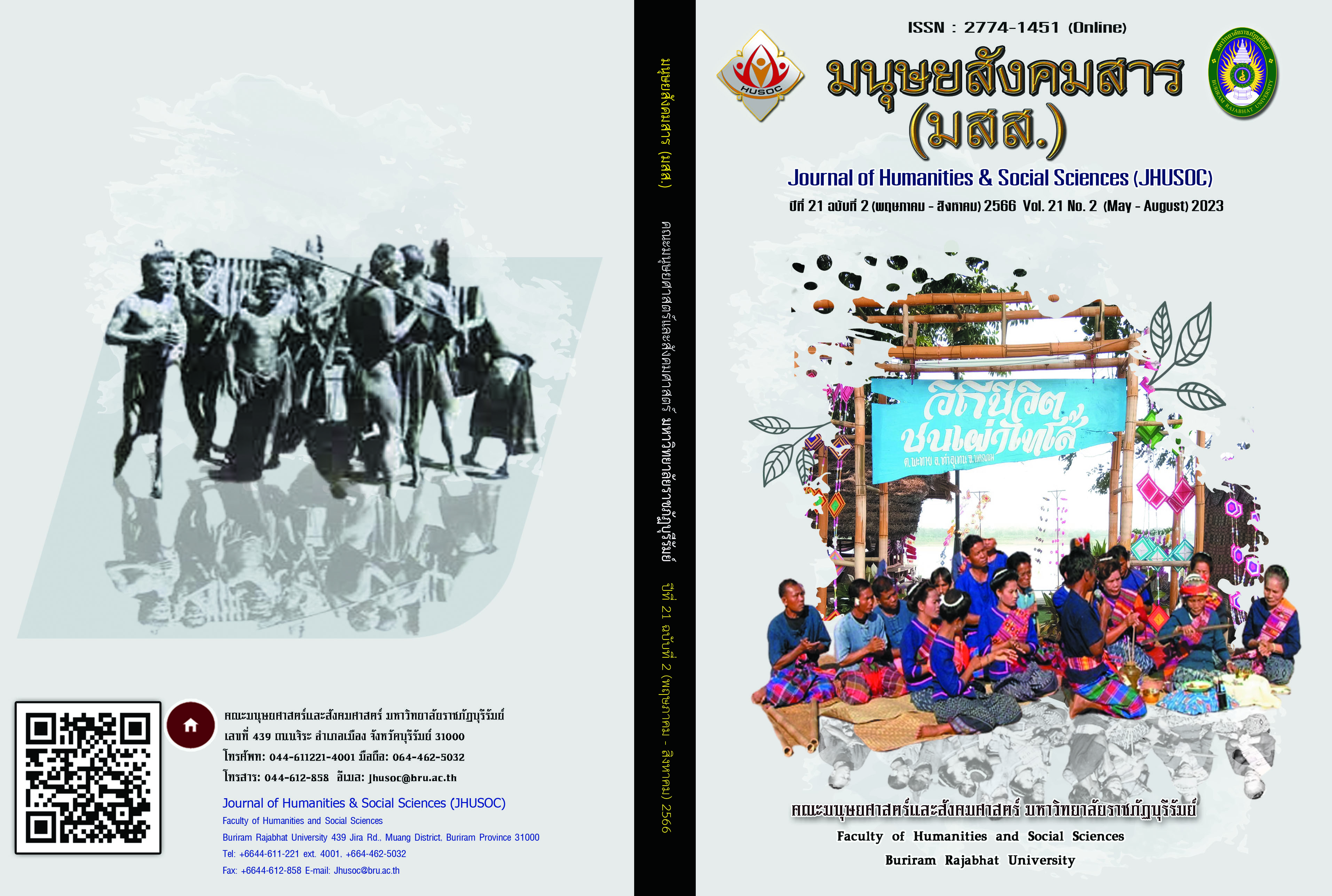An Analytical Study of Rhetorical Questions of Male Celebrities' English Speeches
Main Article Content
บทคัดย่อ
Nowadays, celebrities have been expressing their viewpoints through various mass media outlets, including social media, interviews, and speeches. Giving speech is one strategy that can incorporate rhetorical question (RQs) into the contents. The objectives of this study were 1) to investigate the use of RQs in English speeches delivered by male celebrities featured on the English Speeches Channel on YouTube, and 2) to analyze the use of RQs in English speeches given by male celebrities. Data was collected through purposive sampling from 45 speeches delivered by male celebrities from 2018 to 2022. The study found that Debating, Arguing or Questioning was the most used, followed by Evaluation and Functionality, A Series of RQs, A Question that is Immediately Answered, and Highlighting a New Subject respectively. However, the Combination of RQs were the least frequently used. The research results demonstrated that the speakers employed RQs to encourage the audience to recognize and appreciate the importance of the message they intended to pass on in their speeches. Furthermore, using RQs strengthens the valuable speech.
Article Details

อนุญาตภายใต้เงื่อนไข Creative Commons Attribution-NonCommercial 4.0 International License.
เนื้อหาและข้อมูลในบทความที่ลงตีพิมพ์ในวารสารทดสอบระบบ ThaiJo2 ถือเป็นข้อคิดเห็นและความรับผิดชอบของผู้เขียนบทความโดยตรงซึ่งกองบรรณาธิการวารสาร ไม่จำเป็นต้องเห็นด้วย หรือร่วมรับผิดชอบใดๆ
บทความ ข้อมูล เนื้อหา รูปภาพ ฯลฯ ที่ได้รับการตีพิมพ์ในวารสารทดสอบระบบ ThaiJo2 ถือเป็นลิขสิทธิ์ของวารสารทดสอบระบบ ThaiJo2 หากบุคคลหรือหน่วยงานใดต้องการนำทั้งหมดหรือส่วนหนึ่งส่วนใดไปเผยแพร่ต่อหรือเพื่อกระทำการใดๆ จะต้องได้รับอนุญาตเป็นลายลักอักษรจากวารสารทดสอบระบบ ThaiJo2 ก่อนเท่านั้น
เอกสารอ้างอิง
Aboiye, T. O. (2009). Typology of rhetorical questions as a stylistic device in writing. The International Journal Society and Culture, 29, 1-8.
Abioye, T. (2011). Preference for rhetorical questions as an index of textual message effectiveness. International Journal of Humanities and Social Science, 1(11), 290-299.
Ahluwalia, R., & Burnkrant, R. E. (2004). Answering questions about questions: a persuasion knowledge perspective for understanding the effects of rhetorical questions. Journal of Consumer Research, 31(2004), 26-42.
Derakhshani, M., Qaiwer, S., Kazemian, B., & Mohammadian, S. (2021). Critical
discourse analysis and rhetorical tropes in Donald Trums’ first speech to the UN. Theory and Practice in Language Studies, 11(10), 1224-1236.
Han, C-H. (2002). Interpreting interrogatives as rhetorical questions. Lingua, 11(3), 201- 229. DOI:10.1016/S0024-3841(01)00044-4
Ioussef, D., Breitholtz, F., & Howes, C. (2021). Don’t you think that a rhetorical question can convey an argument? In Proceeding of the 25th Workshop on the Semantics and Pragmatics of Dialogue, September 20-22, 2021. 1-11. Potsdam, The Internet.
Jameel, M. M., Al-Ameedi, R. T. K., & Al-Shukri, S. M. H. (2023). A pragmatic study of rhetorical questions in Shakepeare’s Twelth night and hamlet. Basic Education College Magazine For Educational and Humanities Sciences, 1(14), 574-597.
Khamees, K. S. (2015). An assessment of EFL learners’ ability to identify and interpret rhetorical questions: A pragmatic perspective study. Arab World English Journal, 6(3), 367-381.
Kluge, A. (2018). Rhetorical questions in Papuan Malay, Other Malayic Languages, & the Papuan Languages of West Papua. Journal of the Southeast Asian Linguistics Society JSEALS, 11(2), 87-118.
Nahroji, M. N., Haryudin, A., & Andriani, L. (2020). Analyzing a speech and grammar use Fathia Izzati and Nessie Jedge in the Video of Cara Berbahasa Inggris Lancar. Professional Journal of English Education, 3(1), 101-108.
Nakashima, T. (2018). Some syntatic character of rhetorical questions. Explorations in English Linguistics, 32, 67-99.
Neitsch, J., Braun, B., & Dehé, N. (2018). The role of prosody for the interpretation of rhetorical questions in German. Speech Prosody. In
th International Conference on Speech Prosody 2018, 13-16 June 2018, 192-196. Poznań, Poland.
Oraby, S., Harrison, V., Misra, A., Riloff, E., & Walker, M. (2017). Are you serious?: Rhetorical questions and Sarcasm in social media dialog. In Proceedings of the 18th Annual SIGdial Meeting on Discourse and Dialogue, pp. 310–319, Saarbrücken, Germany. Association for Computational Linguistics.
Ranganath, S., Hu, X., Tang, J., Wang, S., & Liu, H. (2016). Identifying rhetorical questions in social media. In Proceeding of the Tenth
International AAAI Conference on Web and Social Media (ICWSM 2016). 667-670.
Rattanawaropas, W., & Panthong, P. (2021). Structure of spoken clusters in Ted talks. Journal of Humanities & Social Sciences (JHUSOC), 19(3), 203-225. [in Thai]
Rexach, J. G. (1998). Rhetorical questions, relevance and scales. Revista Alicantina de Estudios Ingleses, 11(1998), 139-155.
Rohde, H. (2006). Rhetorical questions as redundant interrogatives. San Diego Linguistics Papers. 2(2006), 134-168.
Salih, A. A. (2021). Investigating rhetorical aspects of writing argumentative essays and persuasive posters: Students’ perspective. Theory and Practice in Language Studies, 11(12), 1571-1580.
Schmidt-Radefeldt, J. (1977). On so-called rhetorical questions. Journal of Pragmatics. 1(4), 375-392.
Špago, D. (2016). Rhetorical questions or rhetorical uses of questions?. explorations in English language and linguistics, 4(2), 102-105.
Wang, X. (2014). A cognitive pragmatic study of rhetorical questions. English Language and Literature Studies, 4(1), 42-47.
Zhang, J., Spirling, A., & Danescu-Niculescu-Mizil, C. (2017). Asking too much?
The Rhetorical Role of Questions in Political Discourse. In Proceedings of the 2017 Conference on Empirical Methods in Natural
Language Processing, pp. 1558–1572, Copenhagen, Denmark. Association for Computational Linguistics.
Zhuang, Y., & Riloff, E. (2020). Exploring the role of context to distinguish rhetorical and information-seeking questions. In Proceedings of the 58th Annual Meeting of the Association for Computational Linguistics: Student Research Workshop, pp. 306–312, July 5 - July 10, 2020. Association for Computational Linguistics.


